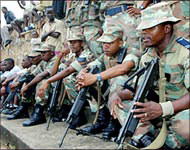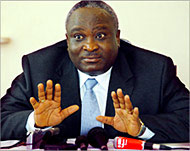UN envoys meet rival Burundi groups
Ambassadors from 15 UN Security Council members met with Burundian government and rebel leaders in the Tanzanian capital of Dar al-Salam on Sunday in talks aimed at ending Burundi’s civil war.
 |
| African troops want to disarm rebel groups |
Forces for Defence of Democracy (FDD) leader, Pierre Nkurunziza, said his talks with UN ambassadors were centred on the implementation of a ceasefire.
“The UN revisited the appeal that all parties should stop fighting and implement the peace agreement”, Nkurunziza said.
Special representative of UN Secretary General Kofi Annan, Berhanu Dinka, said he was optimistic the peace process in Burundi would see progress at a summit of regional leaders to be held later this month.
“I am optimistic that things will move forward”, he said, following a meeting between the 15 UN Security Council ambassadors and Nkurunziza.
The UN delegation is led by French ambassador, Jean-Marc de La Sabliere.
Dinka said African leaders would deal with Burundi after the East African Community (EAC) summit to be held on 20 June in the Kenyan capital Nairobi.
Leaders from Burundi, Rwanda, Ethiopia and the Democratic Republic of Congo will go to Nairobi after the summit and meet leaders of Kenya, Tanzania and Uganda, according to the UN official.
The Burundi peace accord was reached in the northern Tanzanian town, Arusha, in August 2000 by 19 political parties, the Burundian government and parliamentarians.
But it excluded the National Liberation Forces (NLF) and the DFF, which are the two largest Hutu rebel groups.
A power-sharing government was established under the agreement.
The accord also provided a transitional national assembly of 60 percent Hutus, 40 percent Tutsis and a Senate consisting of equal numbers of representatives for the Hutu and Tutsi ethnic groups.
 |
| Ndayizeye became president under the Arusha process |
The Arusha process allowed Domitien Ndayizeye, a Hutu, to assume the post of presidency on 1 May, succeeding Jean-Pierre Buyoya, a Tutsi.
Conflict
Civil war erupted in the central African country in 1993 after the assassination of the country’s first democratically elected Hutu president, Melchior Ndadaye.
A variety of rebel groups, drawn from the mainly Hutu majority, fight against an army controlled by the Tutsi minority that make up around 15 percent of the population.
Tutsis have dominated politics since the country’s independence from Belgium in 1962.
South African, Ethiopian and Mozambican troops are deployed in Burundi as “peacekeepers” empowered to disarm the groups that have signed the ceasefire.
The FDD signed a ceasefire on 2 December, but has maintained its military activities against the Burundi army.
Its leader, Nkurunziza, blamed the Burundi army for the ongoing conflict, saying the FDD was fighting in self-defence.
Nkurunziza told the ambassadors that he refrained from implementing the ceasefire agreement because there were certain conditions that had to be agreed on in a meeting before 30 December. But the meeting was never held.